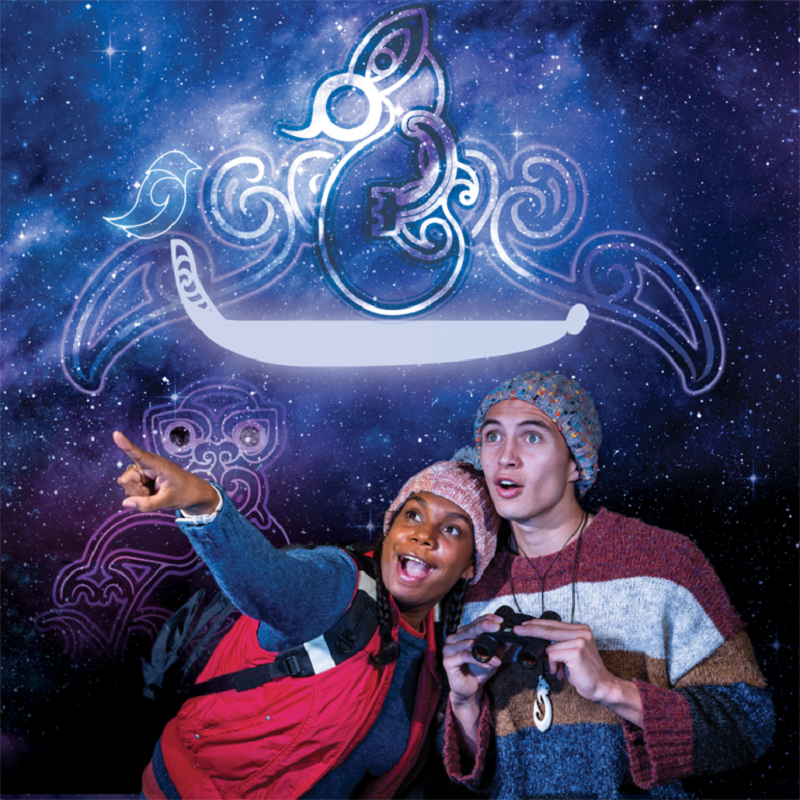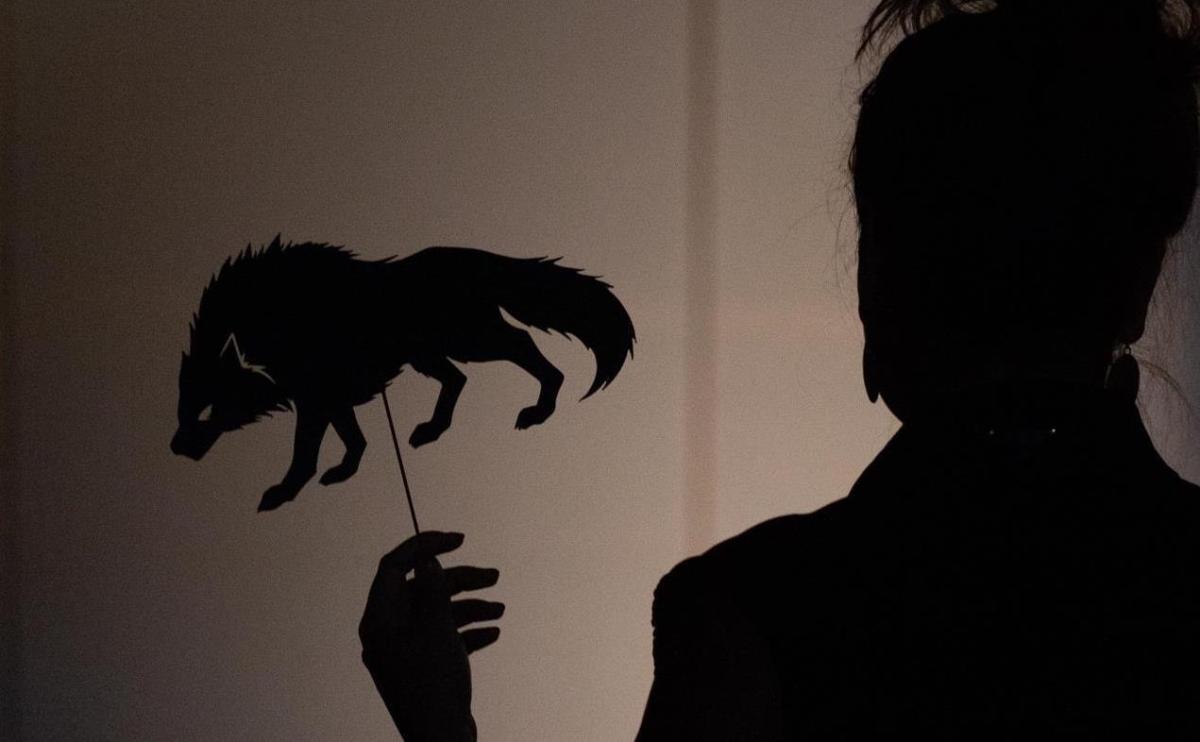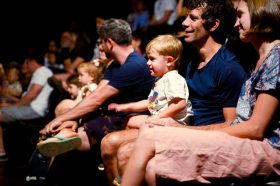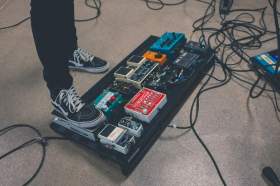Navigating cultural differences and the intricacies of translation, plus the challenges of budget blowouts and working across different time zones: international co-productions are fraught at the best of times.
Add in a global pandemic, and staging work involving international artists and partners would seem to be impossible – but not quite.
Despite border closures and quarantine restrictions, upcoming productions at Ten Days on the Island and Adelaide Festival which feature visiting artists from Aotearoa/New Zealand and Ireland respectively, are going ahead despite the disruptions and setbacks their teams have experienced along the way.
COVID’s impacts on Hide the Dog, a cross-cultural, trans-Tasman creation from pakana playwright Nathan Maynard and Māori writer Jamie McCaskill have been ‘enormous,’ according to its producer Annette Downs – which isn’t to say they’ve been insurmountable.
‘Someone said to me recently that they can’t wait for this year, because last year was dreadful, and I said “No, it’s just been different.” World War One was pretty dreadful. But for us – not everybody, for some people it’s been horrendous – but through our experience with this particular show, where no one’s suffered from getting COVID, it’s meant a different way of doing things. So what can we find that’s positive? And what can we manage that’s challenging?’ said Downs about her approaching to ensuring the show could go ahead.
Among the many challenges facing the world premiere season of Hide the Dog – a family-friendly show produced by Tasmania Performs, about two children who stumble upon the last Tasmanian Tiger and vow to keep it safe – was the cancellation of its Sydney season in January due to the Avalon cluster on Sydney’s northern beaches.
‘The Sydney Festival run was cancelled two days before we flew to Sydney,’ Downs said, still sounding slightly stunned several weeks later.
‘Someone said to me recently that they can’t wait for this year, because last year was dreadful, and I said “No, it’s just been different.”’
– Annette Downs, Tasmania Performs
Even before that, she faced the significant challenge of getting two Māori performers out of New Zealand and into Australia with no guarantees they’d be able to get back home.
‘The whole point of this exercise, and yes, it’s a children’s show, but the point of the exercise was First Nations cross-cultural sharing. So we got lucky with the two performers; we could bring them from New Zealand just in time. The borders opened so they could come across for the rehearsal period for three weeks,’ she explained.
‘So it was wonderful that they could come, but of course, what happened is we couldn’t get them back for Christmas because we couldn’t get a quarantine voucher.’
Instead, showing the adaptability that’s a trait of all great producers, Downs told the pair: ‘I’ll give you the equivalent of what it would cost us to send you home and put you into quarantine and you guys can have a holiday in Australia over the four week break instead.
‘So that was about creative problem solving. You go, “Okay, well, this is a negative, how do I turn that into a positive?” Both of them had some family in Australia, so that turned out to be okay. And the budget was still being used to pay for quarantine but I least I turned that from a negative into something that was able to be utilised to keep them in the country … It was an insurance scheme, you know? No matter what, I’ve already got them in town, they’ll be there.’
LOOKING ON FROM AFAR
While the two actors were able to make it to Australia, playwright Jamie McCaskill was stuck at home, unable to physically be in the room during late-stage rehearsals.
‘The bulk of the collaboration had been done before Hide the Dog was due to be staged, so the biggest impact on my part was not being able to be present during rehearsals to rewrite with Nathan [Maynard] on the floor, ‘ McCaskill told ArtsHub.
‘So I had to Zoom in and trust that the process was going well, and that I wasn’t being too left out as a writer, when it came to telling the stories from a Māori perspective, a New Zealand perspective. So the impact of me having some kind of hands-on approach to the creative process was affected, but I came to terms with that and that’s the way it was. But if COVID hadn’t happened I would have definitely been over there for the final rehearsals to input to the play culturally,’ he said.

Hide the Dog playwrights Jamie McCaskill (left) and Nathan Maynard. Photo credit: Tasmania Performs.
His absence put more pressure on the New Zealand actors, given that McCaskill was responsible for ensuring the story’s cultural authenticity.
‘I talked to one of the actors who was over there, and not to throw too much responsibility on him, but [told him] if big things come up you can call me, that kind of thing. So putting it in the hands of other people in some ways, I felt a little bit irresponsible in doing it, but that was what we had to do.’
Irish folk singer Lisa O’Neill is one of the key creatives for The Boy Who Talked to Dogs (a Slingsby and State Theatre Company South Australia co-production in association with Adelaide Festival, developed with the assistance of Dublin’s Draíocht Arts Centre). Based on the memoir by Irish-born, Lismore-based writer Martin McKenna, it tells the story of a teenager who runs away from a violent home and falls in with a pack of street dogs – who help him understand the vital importance of family, courage, and self-respect.
Like McCaskill, O’Neill has also been unable to travel to Australia for the play’s world premiere, at which she originally intended to play her new compositions live.
‘That was the plan, yeah, so it’s a little bit heartbreaking for us not to be able to continue on with that,’ O’Neill said.
Instead, she’s entrusted the songs to Australian musician Victoria Falconer, who will perform them live when The Boy Who Talked to Dogs opens in Adelaide next week.
‘I think that the strangest thing for me is that this is the first time that I’ve written a song for someone else to sing. So that’s a big deal,’ O’Neill said.
‘But the fact is that not only can I go into a room and translate the song for someone else – they’re in Australia and I’m in Ireland – and there isn’t much I can do about it, only trust. And you know, I think when we hand things over or open up our arms to allow someone else in creatively, and really trust that, then it can be a very special thing.
‘You have to let go of your ideas sometimes. And they don’t belong to me anyway. They’re only ideas I picked out of the sky,’ O’Neill told ArtsHub.
PERSEVERENCE AND PRESENCE
Andy Packer, Slingsby’s Artistic Director and CEO, was compelled to secure the rights to The Boy Who Talked to Dogs and adapt it for the stage after hearing McKenna speaking about his life on ABC Radio’s Conversations program in 2016.
Development on the production began in 2018, and from the beginning, Packer knew that the play needed to speak directly and truthfully to its Irish origins.
‘We’ve really thought carefully about who gets to tell whose stories,’ he explained. ‘And whilst this is a story that spans Ireland and Australia, a big part of the story in the play is the Irish experience. So it was important to have an Irish performer tell that story and have an Irish playwright write the play.’
Read: Why Australia still dances to an Irish tune
Like O’Neill, playwright Amy Conroy has been unable to travel to Australia. ‘It would have been great for her to be here, and for Lisa O’Neill to be with us as well,’ Packer explained.
‘But in conversations with SA Health and Adelaide Festival, we were advised – and I think correctly – that we should just have an ambition of one international artist. It certainly led to a whole lot more work for the team to get someone through that process and get them into the country.’
Irish folk singer Lisa O’Neill has contributed six new songs to The Boy Who Talked To Dogs.
In order to be allowed into Australia, Irish actor Bryan Burroughs had to quarantine in Perth for two weeks following his arrival in Australia, which at least allowed him to participate in Zoom rehearsals now that he was in roughly the same time zone as Adelaide.
‘He’s absolutely thrilled to be here, making theatre and being able to be in a room and collaborate in Australia where you can move about relatively normally, compared to everybody else who’s absolutely in lockdown in Ireland at the moment. He is one very happy actor,’ Packer said.
‘He also self-quarantined, really, for about a month before he got on the plane as well, so he was taking it extremely seriously.’
Unfortunately, playwright Amy Conroy cannot be as directly involved in the rehearsal process. ‘Timeframes are quite tricky for that,’ explained Packer. ‘It’s either three in the morning for her or us being here rehearsing at night … but the script’s been in development since 2019, when Amy and Lisa joined us in Adelaide for two weeks. And since then we’ve also built a really great, trusting relationship, where we’ve been able to try things out on the floor in terms of any reductions or word change, and then send that back to Amy.
‘And just last night, I had a great meeting with Amy, just kind of checking in and making sure she was happy with everything. And she’s also seen a video of a full run of the show. So we’re doing it that way, rather than having lots and lots of Zooms at weird times of the day.’

Bryan Burroughs (left) and Andy Packer in rehearsal for The Boy Who Talked To Dogs. Photo credit: Jessica Zeng.
Given the present situation in Ireland, where COVID has claimed the lives of 4,036 people to date (compared to 909 in Australia), O’Neill is delighted to know her work is going to be performed in Australia, even if she can’t be there herself.
‘Victoria is going to hold the light now. And it’s kind of magic, you know, because we are in proper heavy lockdown here in Ireland at the moment. It’s very bad here. The pandemic is very, very bad here and I’m locked up here … I can’t go on stage and sing, which I really miss, but so someone else is doing it for me, and that’s kind of beautiful,’ O’Neill said.
She is also heartened by the fact that the production is going ahead at all.
‘Australia is doing great and it’s really inspiring for everyone else, for the rest of the world who are really struggling with [COVID] a lot more at the moment. It’s really inspiring for us to know that the stages are opening up over there and that this show is going to go on.’
THE COSTS OF COVID
For Downs, producing Hide the Dog in the midst of the pandemic has been ‘a swings and roundabouts exercise’.
She explains: ‘I had costed in the composer, the designer and the writer from New Zealand to come and live and work here for three weeks. So that’s expensive, because it’s accommodation, flights, transfers, salaries, blah, blah, blah. So that was a saving because they were on Zoom instead – a saving monetarily, not necessarily a saving culturally.’
Conversely, there have been unexpected costs in other areas, such as the need to hire a new staff member in order to secure quarantine vouchers through New Zealand’s Managed Isolation Allocation System.
‘Things like getting a quarantine voucher to get my artists back into New Zealand after Ten Days? I spent over a week and a half trying to get them, and in the end, I paid someone to sit and stare at a computer screen and hit refresh because basically, randomly, at three in the morning or any old time, someone might decide they’re not going to go home and they cancel their flight and their voucher pops up for about a second and a half. And there’s you and 20 other people who are trying to get home for a funeral or whatever who kind of grab that date. And it’s the first click to get the date to get your voucher,’ Downs explained.
‘So in the end, the only way I could get them home was that I paid someone full time to sit at a computer and just look at that screen and hit refresh, refresh, refresh. And he was able to get them both back home after Ten Days on the Island – which hasn’t happened yet.’

Publicity image for Hide the Dog via Ten Days on the Island.
Despite the setbacks, there have been some positives to emerge from the process of working over Zoom, such as the experience of sound designer/composer and Māori cultural advisor, Maaka McGregor.
‘He said that he’ll never leave his sound studio again to go into rehearsal rooms … Normally, he’d sit in the room all day, and then spend all night at home in the studio, making the music. But this way he just had the rehearsal room in his ears and could play along with it, experiment, test things, and then just instantly send them through. So he found it super-efficient and a real discovery,’ Downs said.
Similarly, while Zoom can sometimes feel impersonal, it hasn’t impacted on the relationship between playwrights McCaskill and Maynard.
‘Me and Nathan have a real synergy – so much so that we don’t even know who wrote what when it came to the dialogue in the story,’ said McCaskill.
‘You can’t tell the difference between our two voices. So in terms of collaboration, that’s something that me and Nathan are both really proud of, and of course, the story that we’re presenting.’
Such positives aside, the process of producing Hide the Dog during COVID has been frustratingly unpredictable for Downs.
‘We planned within an inch of our lives, all these various scenarios. But even then, you know, normally you’ve got a contingency, and you can go, “Well, this or this or this could happen.” But the variations on what could happen for 14 people traveling from different nations to come to one place, the decision tree to try and map that would just make my head spin,’ she said.
‘So yes, it was hard. I would say it made it probably more than double the work.’
The Boy Who Talked to Dogs runs from 23 February – 14 March at the Adelaide Showgrounds as part of Adelaide Festival. Hide the Dog runs from 19-21 March at The Theatre Royal, Hobart as part of Ten Days on the Island.





